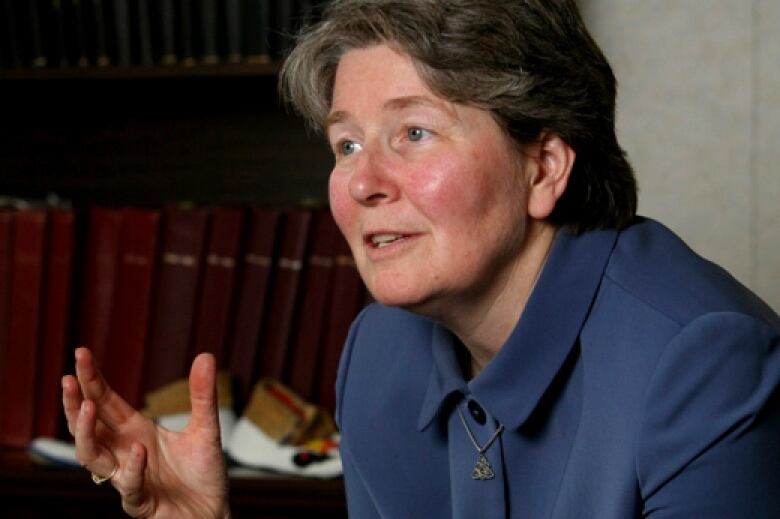Churches face challenge in TRC call to value aboriginal spirituality
Anglican, Catholic and United church leaders say steps happening to recognize indigenous culture

"We have a long way to go," says Anglican Bishop Mark MacDonald, when it comes to a formal recognition of aboriginal spirituality by his church.
It's just one of the actions the Truth and Reconciliation Commission called for in its final report.
About 150,000 First Nations, Inuit and Métis children were taken from their families to attend the schools from the 19th century until 1996. The schools were funded by the government, but most were run by missionaries or staff from the Catholic, Anglican, Presbyterian and United churches.
MacDonald says many people in the pews see residential schools as a well-intentioned project with a few bad eggs, but the TRC report calls it an "example of systemic, institutional evil…that swamped the goodness of the individual people involved."
"The church became a chaplaincy to a particular political-cultural regime," he said. "This calls for us to understand the difference between the church as the body of Christ, and the church that expresses itself as an institution."
For the Anglican church, MacDonald says, reconciliation will mean recognizing the ways it still reflects the same ideas and values that led to residential schools.
'Fine words'
"It's a call for humility on the part of the church, trying to understand something was done by our beloved church in a previous generation that is painful, that was wrong, " says United Church General Secretary Nora Sanders.

The United Church was not involved directly in residential schools in the territories, but it has a congregation in Yellowknife.
The United Church has already made two apologies, one in 1986 at the time of the Royal Commission on Aboriginal Peoples, and another in 1998 specifically about residential schools.
"Really fine words," Sanders says. "It takes longer to live that. The primary thing is to have it not be something just coming from the main office of the church but from congregations across the country."
The United Church has a history of being open to working with other cultures and other faiths. Sanders says they're looking at ways to "fully respect traditions of aboriginal people, recognizing of course that there are many spiritual traditions within the aboriginal people in this country."
'God has long been there'
"There has been a huge shift in the Catholic style of missionary work," since residential schools were started, says Bishop Murray Chatlain.
Chatlain served six years as the Bishop for the Diocese of Mackenzie-Fort Smith in the Northwest Territories and is now the Bishop for the Diocese of Keewatin-Le Pas, which covers parts of Saskatchewan, Manitoba and Alberta.

"Now, whenever we are coming into a new cultural group or tradition the first thing we do is remove our shoes lest we forget that God has long been there before we have come, and we step on something holy," he says.
Chatlain made his own apology in 2009 for the Mackenzie-Fort Smith diocese's role in the residential school system, but there's still been no formal apology to residential school students from the Vatican.
However, Chatlain says the Vatican's openness to aboriginal spirituality was already on display when Pope John Paul II visited Fort Simpson, N.W.T., 25 years ago.
"The drum was used there, there was a tea dance, a lot of the traditional elements were used and very much respected."
He says aboriginal issues have a much higher profile now at national meetings and the Diocese has included aboriginal lay-people at diocesan meetings — a big shift, he says, since he began working in the North eight years ago.
Chatlain says they're also looking at ways of showing more respect for traditional prayers and drum songs in the liturgy.
National indigenous bishop
Anglican bishop Mark MacDonald says accepting indigenous spirituality as a valid form of worship equal to their own will be a challenge for Christians in the pew who "think there is only one way to be Anglican."
But in some ways, MacDonald himself is an indication that the Anglican church is moving forward.
He is aboriginal, with ancestors who were residential school students, and was consecrated as his church's National Indigenous Bishop in 2007. He doesn't have a diocese per se, but is responsible for 225 indigenous churches, mostly on reserves, across Canada.
MacDonald describes those indigenous congregations as a "revolution within the church."
"Indigenous Anglicans are trying to form a church that is self-determining, within the larger church, that expresses the cultural and spiritual needs of indigenous people within that larger framework."
Those cultural practices have always been there, according to MacDonald, "but the church always said 'your success is based on your capacity to mimic what we do.'
"Indigenous Anglicans have always quietly continued, hidden from the view of the missionaries, an indigenous worldview and respect for the ideals and practices of our peoples."
Now, says MacDonald, "We're coming out of the closet."
He says indigenous Anglicans are exploring what it means to be self-determining, while still remaining part of the larger Anglican communion.
"We are learning as we go," MacDonald admits.
"We're hoping and believing that people within the church will give us the freedom to be who we need to be.
"I see this as the beginning of a new day for indigenous people reclaiming their humanity, but also giving back to the peoples who have oppressed them the possibility of a fuller life of peace and hope and justice for all people in Canada."